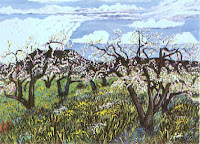Before there was a town, Sebastopol, (first known as Pine Grove) was a place where a road passed through. It was a spot on the road between the Russian River Valley and the mouth of the Petaluma River where the great felled trees would be stacked on boats and floated down to San Francisco. I started thinking about how the town was first only that which was needed: a few shops catering the travelers who passed through before some of those travelers (such as J.H.P. Morris who founded the town) stopped and that which was needed increased to support those who stayed. Here is my draft for today:
At Gateway to the Russian River
When there were just the two worn ox-cart ruts:
a road traveled between the lumbering
camps in the Russian River Valley and
the mouth of the Petaluma River
that which was needed was built roadside
a few salons, blacksmiths, a general store.
The few who stopped were welcomed by the scent
of the tall pines that crowned the hills above
and the wide prairie of the Laguna
where oaks rose offering majestic shade.
What the town would become, months later, years
was still written in the minds passed through
Body stiff from too long sitting at helm
of the massive cart, the mind wanders, spins
cities out of fields, spells fortune out of stars.
At Gateway to the Russian River
When there were just the two worn ox-cart ruts:
a road traveled between the lumbering
camps in the Russian River Valley and
the mouth of the Petaluma River
that which was needed was built roadside
a few salons, blacksmiths, a general store.
The few who stopped were welcomed by the scent
of the tall pines that crowned the hills above
and the wide prairie of the Laguna
where oaks rose offering majestic shade.
What the town would become, months later, years
was still written in the minds passed through
Body stiff from too long sitting at helm
of the massive cart, the mind wanders, spins
cities out of fields, spells fortune out of stars.


























